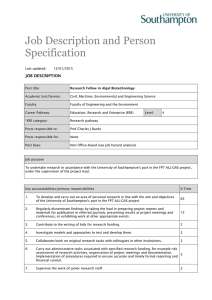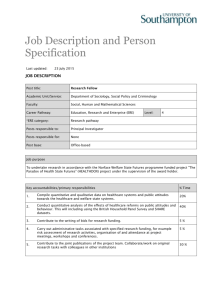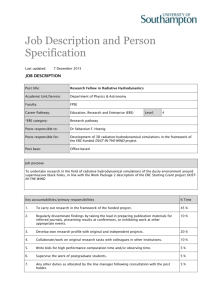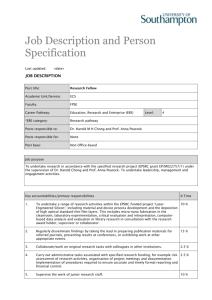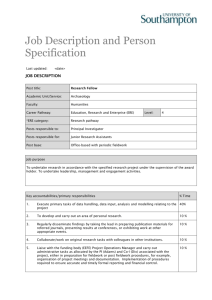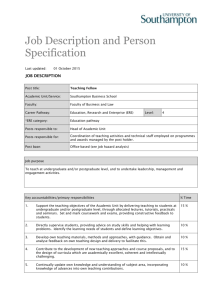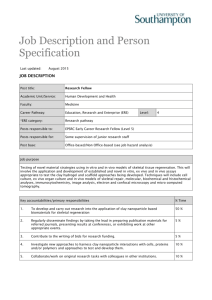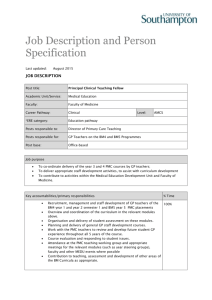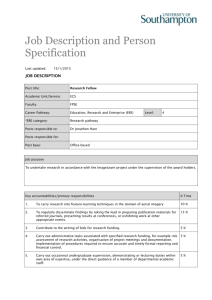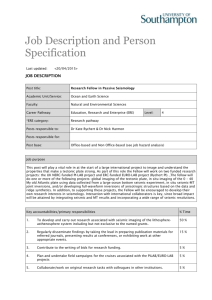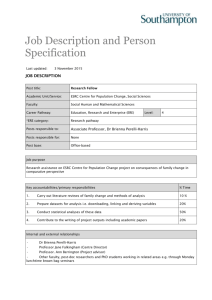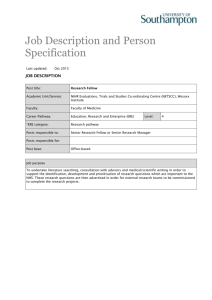Job Description and Person Specification
advertisement
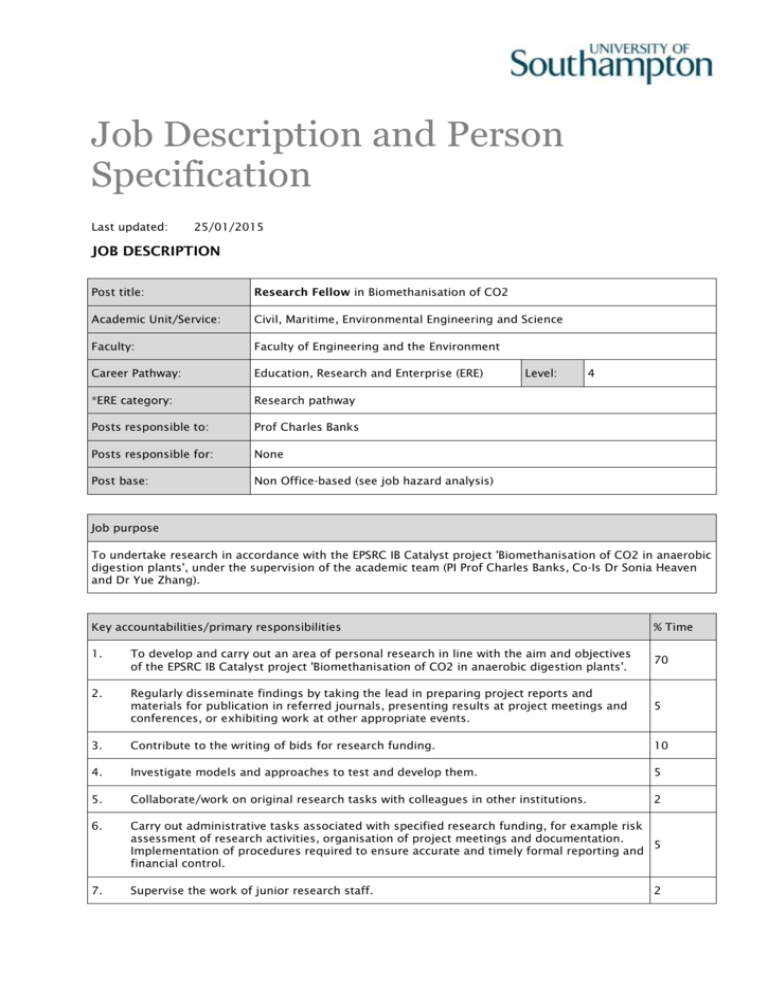
Job Description and Person Specification Last updated: 25/01/2015 JOB DESCRIPTION Post title: Research Fellow in Biomethanisation of CO2 Academic Unit/Service: Civil, Maritime, Environmental Engineering and Science Faculty: Faculty of Engineering and the Environment Career Pathway: Education, Research and Enterprise (ERE) *ERE category: Research pathway Posts responsible to: Prof Charles Banks Posts responsible for: None Post base: Non Office-based (see job hazard analysis) Level: 4 Job purpose To undertake research in accordance with the EPSRC IB Catalyst project 'Biomethanisation of CO2 in anaerobic digestion plants', under the supervision of the academic team (PI Prof Charles Banks, Co-Is Dr Sonia Heaven and Dr Yue Zhang). Key accountabilities/primary responsibilities % Time 1. To develop and carry out an area of personal research in line with the aim and objectives of the EPSRC IB Catalyst project 'Biomethanisation of CO2 in anaerobic digestion plants'. 70 2. Regularly disseminate findings by taking the lead in preparing project reports and materials for publication in referred journals, presenting results at project meetings and conferences, or exhibiting work at other appropriate events. 5 3. Contribute to the writing of bids for research funding. 10 4. Investigate models and approaches to test and develop them. 5 5. Collaborate/work on original research tasks with colleagues in other institutions. 2 6. Carry out administrative tasks associated with specified research funding, for example risk assessment of research activities, organisation of project meetings and documentation. 5 Implementation of procedures required to ensure accurate and timely formal reporting and financial control. 7. Supervise the work of junior research staff. 2 Key accountabilities/primary responsibilities 8. Carry out occasional undergraduate supervision, demonstrating or lecturing duties within own area of expertise, under the direct guidance of a member of departmental academic staff. % Time 1 Internal and external relationships Direct responsibility to holder of research award. Reporting and liaison with collaborators/colleagues in other work areas. Minor reporting and liaison responsibilities to external funding bodies or sponsors. May be asked to serve on a relevant Academic Unit committee, for example research committee. Special Requirements To be able to attend national and international workshops and BBSRC project-related events for the purpose of disseminating research results. Document1ERE Level 4 – Research Pathway – Research Fellow 2 PERSON SPECIFICATION Criteria Essential Desirable Qualifications, knowledge and experience PhD or equivalent professional qualifications and experience in environmental or chemical engineering or biotechnology. Knowledge or experience of microbial community and metabolic pathway analyses. Detailed understanding and knowledge of anaerobic digestion processes. Extensive experience in the design, construction, operation and monitoring of laboratory-scale experimental testing equipment for anaerobic digestion. How to be assessed Application Postdoctoral experience working with larger-scale anaerobic digestion systems. Knowledge of systems for CO2 methanation. Knowledge of chemical and instrumental analytical procedures for assessing the performance and stability of biological treatment / processing systems. Planning and organising Able to organise own research activities to deadline and quality standards Interview Problem solving and initiative Able to develop understanding of complex problems and apply indepth knowledge to address them Application and interview Able to develop original techniques/methods Management and teamwork Work effectively in a team, understanding the strengths and weaknesses of others to help teamwork development Able to supervise work of junior research staff, delegating effectively Interview Able to contribute to Academic Unit management and administrative processes Communicating and influencing Communicate new and complex information effectively, both verbally and in writing, engaging the interest and enthusiasm of the target audience Application and interview Able to present research results at project and group meetings and conferences Able to write up research results for project reports and for publication in leading peer-viewed journals Work proactively with colleagues in other work areas/institutions, contributing specialist knowledge to achieve outcomes Other skills and behaviours Understanding of relevant Health & Safety issues Application and interview Positive attitude to colleagues and students Document1ERE Level 4 – Research Pathway – Research Fellow 3 Special requirements UK driving licence Able to attend national and international workshops, conferences etc especially those linked with BBSRC funding Interview Willing to work flexible hours, including some weekends, when experiments require this Document1ERE Level 4 – Research Pathway – Research Fellow 4 JOB HAZARD ANALYSIS Is this an office-based post? ☐ Yes If this post is an office-based job with routine office hazards (eg: use of VDU), no further information needs to be supplied. Do not complete the section below. ☒ No If this post is not office-based or has some hazards other than routine office (eg: more than use of VDU) please complete the analysis below. Hiring managers are asked to complete this section as accurately as possible to ensure the safety of the post-holder. ## - HR will send a full PEHQ to all applicants for this position. Please note, if full health clearance is required for a role, this will apply to all individuals, including existing members of staff. ENVIRONMENTAL EXPOSURES Occasionally Frequently Constantly (<30% of time) (30-60% of time) (> 60% of time) Outside work Extremes of temperature (eg: fridge/ furnace) X ## Potential for exposure to body fluids ## Noise (greater than 80 dba - 8 hrs twa) ## Exposure to hazardous substances (eg: solvents, liquids, dust, fumes, biohazards). Specify below: Full range of reagents as typically used in standard biochemical laboratory assays for analysis of algal cell composition X Frequent hand washing Ionising radiation EQUIPMENT/TOOLS/MACHINES USED ## Food handling ## Driving university vehicles(eg: car/van/LGV/PCV) ## Use of latex gloves (prohibited unless specific clinical necessity) ## Vibrating tools (eg: strimmers, hammer drill, lawnmowers) PHYSICAL ABILITIES Load manual handling Repetitive crouching/kneeling/stooping Repetitive pulling/pushing Repetitive lifting Standing for prolonged periods Repetitive climbing (ie: steps, stools, ladders, stairs) Fine motor grips (eg: pipetting) Gross motor grips Repetitive reaching below shoulder height Repetitive reaching at shoulder height Repetitive reaching above shoulder height PSYCHOSOCIAL ISSUES Face to face contact with public Lone working ## Shift work/night work/on call duties Document1ERE Level 4 – Research Pathway – Research Fellow 5
